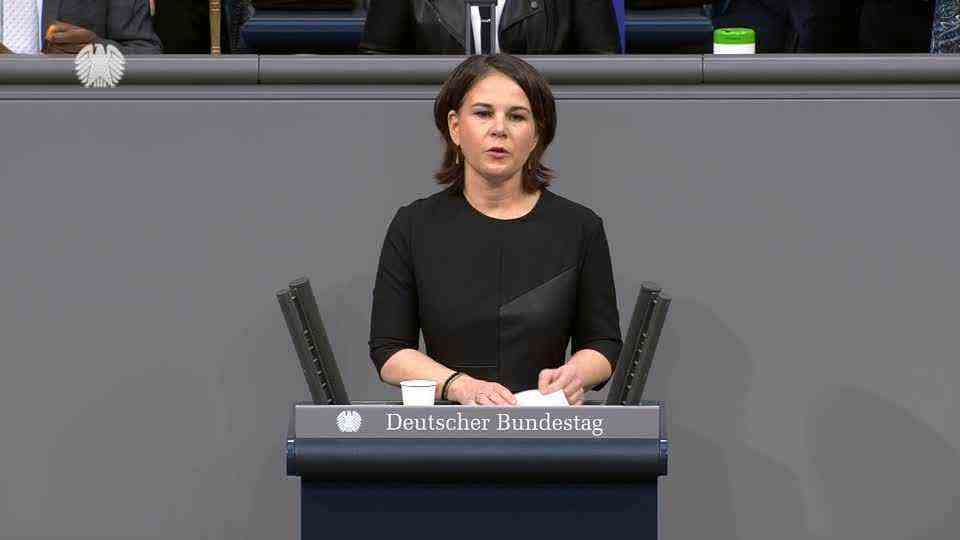Debate in the Bundestag
Baerbock: Nord Stream 2 is part of sanctions against Russia for invading Ukraine
Foreign Minister Annalena Baerbock (Greens): “We have a wide range of answers.”
© Sean Gallup / Getty Images
The gas pipeline Nord Stream 2 is more controversial than ever because of the Ukraine crisis. Foreign Minister Baerbock emphasized in the Bundestag that the supply line is part of the sanctions in the event of a Russian invasion of Ukraine.
The statement by Chancellor Olaf Scholz (SPD) that the Nord Stream 2 gas pipeline between Russia and Germany is a purely private and not a political project is still reverberating. And that, although Scholz has already put this into perspective in the course of the Ukraine crisis. Federal Foreign Minister Annalena Baerbock (Greens) now stated at the start of a Bundestag debate on the Russian deployment on the border with Ukraine: “In the event of a new aggression [Russlands, Anm. d. Red.] We have a wide range of answers at our disposal, including Nord Stream 2.” Ned Price, spokesman for the US Secretary of State, told the US broadcaster CNN a little later that day: “Should Russia invade Ukraine (…), Nord Stream 2 will not be continued.” In this case, Germany will work together to ensure that the pipeline is stopped.
However, the Foreign Minister reiterated her no to German arms deliveries to Ukraine. Although it is correct to “always reflect on one’s actions self-critically in difficult situations” on this point as well, one should not “close doors to de-escalation that are opening so hesitantly again at this very moment,” she pointed out Talks like the one on Wednesday in the so-called Normandy format between Russia, Ukraine, Germany and France.

Ukraine: Majority against arms shipments, according to poll
The government apparently has the support of a majority of Germans for its refusal to deliver weapons to the crisis area. At least that is the result of a representative survey by the opinion research institute YouGov, which was published on Thursday. Accordingly, 59 percent of those surveyed agree with the attitude of the federal government, only 20 percent spoke out in favor of arms deliveries. 21 percent did not provide any information.
Baerbock emphasized in the Bundestag that, regardless of the issue of arms deliveries, unity in the West and teamwork in the Ukraine crisis are crucial. The minister drew a comparison to sport: “You don’t need eleven center forwards in a team”. There are also different roles when dealing with this conflict, Poland and Lithuania are in a different situation than Germany, for example, but also Great Britain or France. Progress in the negotiation process is currently “a priority for this federal government”.
Annalena Baerbock: “Who talks, does not shoot”
“Yes, we want dialogue at all times,” says Baerbock. “Those who talk don’t shoot,” she emphasized. But it is also about “hardness that makes it unmistakably clear: the cornerstones of the European peace order are non-negotiable,” said the minister. Germany and its allies “made it very clear that renewed military action against Ukraine would have massive consequences for Russia.” And these consequences also included consequences for Nord Stream 2.
Surprisingly, the newly elected party leader Friedrich Merz took the lectern for the CDU/CSU instead of the incumbent parliamentary group leader Ralph Brinkhaus. Merz complained that Scholz had not made a government statement and also lacked leadership and had an “obviously very unclear position on Russia”. Instead of Scholz, SPD party leader Lars Klingbeil replied that the CDU politician had ruled out Russia’s exclusion from the Swift international payment system as a sanction for an invasion of Ukraine. In contrast, “all options are on the table” for the federal government. Merz then made it clear: “Swift is also expressly on the table for me when it comes to averting this threat.” However, it must be clear that this will also have significant economic consequences for Germany and the West.
The debate was attended by the Ukrainian ambassador in Berlin, Andriy Melnyk. Melnyk has recently sharply criticized Germany’s refusal to supply defensive arms to Ukraine on several occasions. SPD leader Klingbeil made it clear again during the Bundestag debate: “We are not delivering any weapons to Ukraine.” Nevertheless, it is clear that the current aggression comes from Russia.

